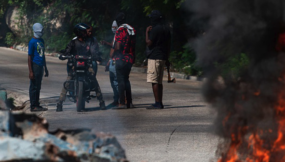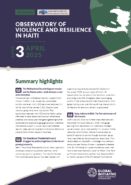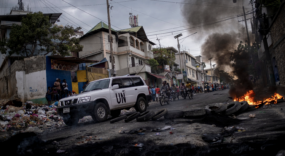A year after the launch of the Multinational Security Support (MSS) mission in Haiti, the country’s crisis continues to escalate. Gangs have increased their power and territorial control, and the mission still faces critical challenges in terms of funding, institutional articulation and coordination with local authorities, and a possible resurgence of political opposition in Nairobi.
The mission’s mandate is to support the Haitian National Police (HNP) in combating the violence and restoring security. Since June 2024, Kenya deployed around 800 police officers to Port-au-Prince as part of the planned multinational force.
However, caught between the political realignment in the United States and paralysis in international aid, the MSS is in a delicate situation. While a peacekeeping mission plan under the auspices of the Organization of American States is being discussed, the Kenyan mission lives in uncertainty. In addition to urgent financial support, a strategic redesign is required to finally establish the operational and tactical foundations of the mission, rethink its collaboration with the HNP, and enable it to adapt to the situation in Haiti, which is on the brink of collapse.
MSS falters in Port-au-Prince
In 2024, at least 5 601 people were killed in Haiti, an increase of over 1 000 from 2023. More than 4 000 of these deaths occurred after the deployment of the MSS. In the first quarter of 2025, at least 1 617 people were killed, indicating a potential annual trend that is still rising.
The gangs, united under the powerful Viv Ansanm coalition, have significantly expanded their territory in the Port-au-Prince metropolitan area and parts of the provincial departments, particularly in the centre of the country (the central plateau and Artibonite). Moreover, the MSS and the HNP, whose cooperation is hampered by problems of coordination, information exchange and inadequate equipment, are facing criminal groups that are better armed, more organized and far larger than a year ago.
While the gangs are functioning more and more like armed militias, the MSS is in danger of being abandoned. In June, a group of 400 police officers is expected back in Nairobi, upon the expiry of their one-year contract with the mission. And only 751 of the planned 1 000 have been deployed. Other contributing countries had pledged to bring the total up to 2 500, but by May 2025 just 40 per cent of that figure had been realized.
In addition to political and financial considerations, the MSS faces logistical obstacles. For example, the mission’s base, located on the tarmac of Toussaint Louverture International Airport in Port-au-Prince, cannot be extended at present, preventing additional deployments. Gangs control 90 per cent of the Haitian capital, almost surrounding the MSS base, and at least 261 officers assigned to Haiti are stranded in Nairobi due to a lack of space and technical support.
As the country teeters on the brink of falling under the control of armed groups, there is a sense in Nairobi of a disconnect between the initial assurances and security challenges on the ground. ‘We didn’t get what we expected,’ a police source in contact with the contingent in Port-au-Prince said, adding that the equipment – guns and armoured personnel vehicles – is either inadequate or substandard, putting the Kenyan forces at further risk.
The Global Initiative Against Transnational Organized Crime (GI-TOC)’s research also indicates that, beyond units and equipment, the MSS lacked initial operational and tactical support to plan its deployment, a situation that continues. The result is that the design of the mission no longer reflects the reality of the situation.
International backers retreat
The MSS is also facing a major shift in the attitude of the international community, particularly the US. During a UN Security Council meeting on Haiti on 21 April, the US indicated that it could withdraw support for the MSS, and called on other donors to contribute. This appeal has so far gone unanswered, illustrating the paralysis of the Security Council in the face of US foot-dragging and the lack of a concrete strategic plan to address the crisis.
On the financial front, several deadlines are approaching, with no strategy in view. These include, crucially, the salaries of around 1 000 international staff and an upcoming payment of US$200 million to the service provider responsible for managing the operational base. The UN, which manages the trust fund for Haiti, has warned that without ‘timely, decisive and concrete international assistance’ the MSS will be left in limbo.
Kenya has adopted a wait-and-see approach. In public, state officials are cautiously optimistic. The foreign affairs ministry has stated that the MSS has enough funds in the UN coffers to last until September 2025. The renewal of the MSS mandate will be on the agenda in October, and Nairobi has urged the international community to shoulder its responsibilities. Speaking at the UN Security Council on 21 April, Kenya’s national security adviser, Monica Juma, spoke of the need to boost the mission’s staffing levels, stressing that it was operating at a ‘suboptimal level’.
Nairobi is currently planning a delegation to Haiti and neighbouring countries that initially promised to contribute police officers to the troubled nation. Prime Cabinet Secretary Musalia Mudavadi is currently in the Dominican Republic to lay ground for the visit. And on 7 May, he met with US Secretary of State Marco Rubio, where the issue of Haiti was discussed.
However, at the heart of the trip scheduled early next month are concerns over the possible freezing of funds. At the same time, Kenya’s team in Haiti is awaiting word from State House, the seat of the Kenyan presidency, on how to proceed. And according to a source in State House, Nairobi does not feel the ball is in its court: ‘Kenya has done its part, now it’s time for the international community to show commitment in light of the new development by the Americans.’
Government insiders insist Kenya is putting on a brave face. The country risks losing upwards of US$35 million in reimbursement, after spending taxpayers’ money on the mission over the past nine months. The recent killing of two Kenyan police officers (in February and March) in Port-au-Prince, with a third taken hostage, threatens to embolden MSS critics and fuel anti-deployment sentiment. However, according to a source within the Kenyan security apparatus, there is a sense that the death toll should not cause a dramatic shift in public perception.
Growing domestic backlash
Critics claim the mission was jinxed from the start. In an interview with the GI-TOC, Ekuru Aukot, the leader of Kenya’s Thirdway Alliance political party, who launched a last-minute high court challenge to the MSS deployment in January 2024, traced the history of what he called ‘failed Haiti interventions’ and painted a bleak picture for the mission: ‘Our police officers should be recalled. They have no equipment; they’re in distress. And the deployment remains unconstitutional.’
In addition, Kenyans were told that any taxpayer money spent on the mission would be refunded, but that assurance has not been delivered upon. George Musamali, a Nairobi-based security analyst, told the GI-TOC that the mission should be paused until the international community provides adequate financial guarantees: ‘Now that Americans are withdrawing, let’s get our police officers back to guard the country. Kenya cannot continue to deploy without surety of reimbursement.’
The announcement in April of the cancellation of US Secretary of State Marco Rubio’s planned visit to Nairobi, just hours after President William Ruto’s departure for a state visit to China, has not improved matters, with sceptics pointing to strained relations between the two countries.
Last stand for Haiti
From Nairobi to Port-au-Prince, New York City and Washington DC, the international community urgently needs to recognize that the MSS is not just another intervention but potentially the last viable opportunity to prevent Haiti’s complete collapse into a gang-controlled state. The mission needs to be placed at the centre of its strategic agenda, with a focus on tactical and operational support as well as material assistance. Without this, the MSS faces imminent failure, representing a shameful missed opportunity and a catastrophic abandonment of the Haitian people. Should the MSS mission in Haiti fail, the responsibility will not rest with Kenya alone, but will reflect a broader shortcoming on the part of the international community.
Une occasion manquée ?
Haïti au bord du gouffre, tandis que la mission kényane reste paralysée
Près d’un an après le lancement de la Mission multinationale d’appui à la sécurité (MMAS) en Haïti, la crise continue de s’aggraver dans le pays. Les gangs ont accru leur pouvoir et leur contrôle territorial, et la MMAS est toujours confrontée à des défis critiques en termes de financement, d’articulation institutionnelle et coordination avec les autorités locales, ainsi qu’à une possible résurgence de l’opposition politique à Nairobi.
Le mandat de la mission est de soutenir la police nationale haïtienne (PNH) dans la lutte contre la violence et le rétablissement de la sécurité. Depuis juin 2024, le Kenya a déployé environ 800 policiers à Port-au-Prince dans le cadre de la force multinationale prévue. Cependant, prise entre le réalignement politique aux Etats-Unis et la paralysie de l’aide internationale, la MMAS se trouve dans une situation critique. Alors qu’un plan de mission de maintien de la paix sous l’égide de l’Organisation des États américains est en cours de discussion, la mission kenyane vit dans l’incertitude. Outre un soutien financier urgent, une refonte stratégique s’impose pour enfin établir les bases opérationnelles et tactiques de la mission, repenser sa collaboration avec la PNH et lui permettre de s’adapter à la situation d’Haïti, au bord de l’effondrement.
La MMAS vacille face à la violence des gangs
En 2024, au moins 5 601 personnes ont été tuées en Haïti, une augmentation de plus de 1 000 personnes par rapport à 2023. Plus de 4 000 de ces décès sont survenus après le déploiement du MMAS. Au cours du premier trimestre 2025, au moins 1 617 personnes ont été tuées, indiquant une tendance annuelle qui continuerait potentiellement d’augmenter.
Les gangs, réunis au sein de la coalition Viv Ansanm, ont considérablement étendu leur territoire dans la zone métropolitaine de Port-au-Prince et dans une partie des départements provinciaux, notamment dans le centre du pays (plateau central et Artibonite). Par ailleurs, la MMAS et la PNH, dont la coopération est entravée par des problèmes de coordination, d’échange d’informations et d’équipements inadéquats, font face à des groupes criminels mieux armés, plus organisés et aux effectifs beaucoup plus nombreux qu’il y a un an.
Alors que les groupes criminels les plus puissants fonctionnent de plus en plus comme des milices armées, la MMAS risque d’être sacrifiée sur l’autel de la paralysie internationale. En juin, un groupe de 400 policiers est attendu à Nairobi, de retour au pays à l’expiration de leur contrat d’un an avec la mission, réduisant encore le personnel présent en Haïti. Tandis que le Kenya a déployé un peu plus de 750 policiers, d’autres pays contributeurs, qui s’étaient initialement engagés à porter le total à 2 500, n’ont jamais dépassé 40 % de ce chiffre total, portant à environ 1 000 le nombre d’officiers déployés.
Outre les considérations politiques et financières, la MMAS est confrontée à des obstacles logistiques. Par exemple, la base opérationnelle de la MMAS, située sur le tarmac de l’Aéroport International Toussaint Louverture à Port-au-Prince, ne peut être étendue pour le moment, ce qui empêche des déploiements supplémentaires. Tandis que les gangs contrôlent près de 90 % de la capitale haïtienne, entourant presque le quartier général de la MMAS, au moins 261 officiers affectés à Haïti sont bloqués à Nairobi en raison du manque d’espace pour les loger.
Face à ce contexte, des interlocuteurs kényans ont exprimé leur scepticisme. A Nairobi, « nous avons le sentiment qu’il y a un décalage entre les assurances initiales et les problèmes de sécurité sur le terrain. Nous n’avons pas obtenu ce que nous attendions », a déclaré une source policière en contact avec le contingent à Port-au-Prince, ajoutant que l’équipement – fusils et véhicules blindés de transport de troupes – est soit inadéquat, soit inférieur aux normes, ce qui expose les forces kenyanes à des risques supplémentaires.
Les recherches de Global Initiative Against Transnational Organized Crime (GI-TOC) indiquent également qu’au-delà des unités et des équipements, la MMAS a manqué d’un soutien opérationnel et tactique initial pour planifier son déploiement, une situation qui perdure. Il en résulte que la conception de la mission ne reflète pas la réalité de la situation sur le terrain.
Les bailleurs de fonds internationaux se retirent
La MMAS est également confrontée à un changement majeur dans l’attitude de la communauté internationale, en particulier des États-Unis. Lors d’une réunion du Conseil de sécurité des Nations unies sur Haïti, le 21 avril, les États-Unis ont indiqué qu’ils pourraient retirer leur soutien au MMAS et ont appelé les autres donateurs à contribuer. Cet appel est resté sans réponse jusqu’à présent, illustrant la paralysie du Conseil de sécurité face à l’indécision américaine et l’absence d’un plan stratégique concret pour faire face à la crise.
Sur le plan financier, plusieurs échéances approchent, sans qu’aucune stratégie ne soit envisagée. Il s’agit notamment, et c’est crucial, des salaires d’environ 1 000 employés internationaux et d’un paiement à venir de 200 millions de dollars au prestataire de services chargé de gérer la base opérationnelle. L’ONU, qui gère le fonds fiduciaire pour Haïti, a prévenu que sans « une aide internationale opportune, décisive et concrète », la MMAS serait quasiment abandonnée à son sort.
Le Kenya a adopté une approche attentiste. En public, les représentants de l’État font preuve d’un optimisme prudent. Le ministère des affaires étrangères a déclaré que la MMAS disposait de suffisamment de fonds pour tenir jusqu’en septembre 2025. Mais le renouvellement du mandat de la MMAS sera à l’ordre du jour en octobre, et Nairobi a exhorté la communauté internationale à assumer ses responsabilités. S’exprimant devant le Conseil de sécurité, le 21 avril, la conseillère nationale à la sécurité du Kenya, Monica Juma, a évoqué la nécessité de renforcer les effectifs de la mission, soulignant qu‘elle fonctionnait à un « niveau sous-optimal ».
Nairobi prévoit actuellement d’envoyer une délégation en Haïti et dans les pays voisins qui avaient initialement promis de fournir des policiers à la Mission. Le premier secrétaire du cabinet, Musalia Mudavadi, se trouve actuellement en République dominicaine pour préparer la visite. Le 7 mai, il a rencontré le secrétaire d’État américain Marco Rubio, avec qui il a discuté de la question d’Haïti.
Cependant, au cœur du déplacement prévu au début du mois prochain se trouvent toujours les inquiétudes quant à un éventuel gel, ou la disparition des fonds. Dans le même temps, l‘équipe kenyane en Haïti attend des nouvelles de State House, le siège de la présidence kenyane, sur la manière de procéder. Et selon une source au State House, Nairobi n’a pas l’impression que la balle est dans son camp : « le Kenya a fait sa part, il est maintenant temps pour la communauté internationale de montrer son engagement, à la lumière des nouveaux développements aux Etats-Unis ».
Des sources gouvernementales insistent sur le fait que le Kenya fait bonne figure, alors que le pays risque de perdre plus de 35 millions de dollars de remboursement, après avoir avancé l’argent des pour la mission au cours des neuf derniers mois. Les récents assassinats de deux policiers kenyans (en février et mars) à Port-au-Prince, et la prise en otage d’un troisième, risquent d’enhardir les détracteurs de la MMAS et d’alimenter le sentiment d’anti-déploiement. Toutefois, selon une source au sein de l’appareil de sécurité kenyan, on estime que le nombre de morts ne devrait pas modifier radicalement la perception du public.
Une opposition intérieure en rebond ?
Les critiques kenyanes affirment que la mission était vouée à l’échec dès le départ. Dans un entretien avec GI-TOC, Ekuru Aukot, le leader du parti politique kenyan Thirdway Alliance, qui a lancé un recours de dernière minute devant la Haute Cour contre le déploiement du MMAS en janvier 2024, a retracé l’histoire de ce qu’il a appelé les « interventions ratées en Haïti » et a dressé un tableau sombre de la mission : « Nos officiers de police devraient être rappelés. Ils n’ont pas d’équipement, ils sont en détresse. Et le déploiement reste inconstitutionnel ».
En outre, les Kenyans ont été informés que l‘argent dépensé pour la mission serait remboursé, mais cette assurance n’a pas été respectée. George Musamali, un analyste basé à Nairobi, a déclaré au GI-TOC que la mission devrait être suspendue jusqu’à ce que la communauté internationale fournisse des garanties financières adéquates : « Maintenant que les Américains se retirent, il faut que nos policiers reviennent pour garder le pays. Le Kenya ne peut pas continuer à se déployer sans garantie de remboursement ».
L’annonce en avril de l’annulation de la visite prévue par le secrétaire d’État américain Marco Rubio à Nairobi, quelques heures seulement après le départ du président William Ruto pour une visite d’État en Chine, n’a pas amélioré les choses, les sceptiques pointant du doigt les relations tendues entre les deux pays.
Dernière chance pour la MMAS ?
Si la mission MMAS en Haïti échoue, la responsabilité sera difficilement imputable au Kenya, mais reflétera une défaillance plus générale de la communauté internationale. De Nairobi à Port-au-Prince, en passant par New York et Washington DC, la communauté internationale doit d’urgence reconnaître que la MMAS n’est pas une simple intervention de plus, mais potentiellement la dernière opportunité viable d’empêcher l’effondrement complet d’Haïti. La mission doit être placée au centre de son agenda stratégique, en mettant l’accent sur le soutien tactique et opérationnel ainsi que sur l’assistance matérielle. Sans cela, la MMAS est au bord d’un échec imminent, représentant une opportunité manquée et un abandon catastrophique du peuple haïtien.



